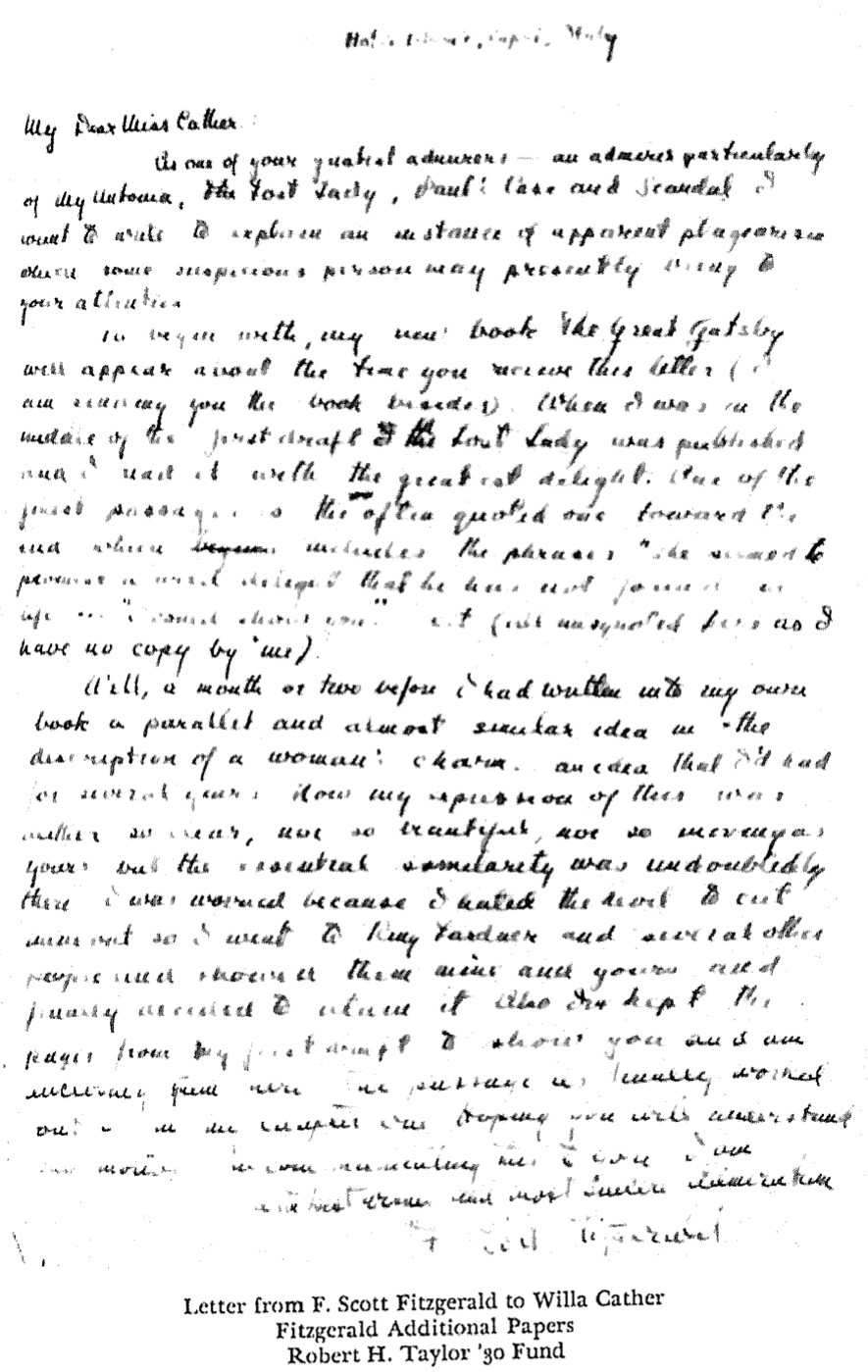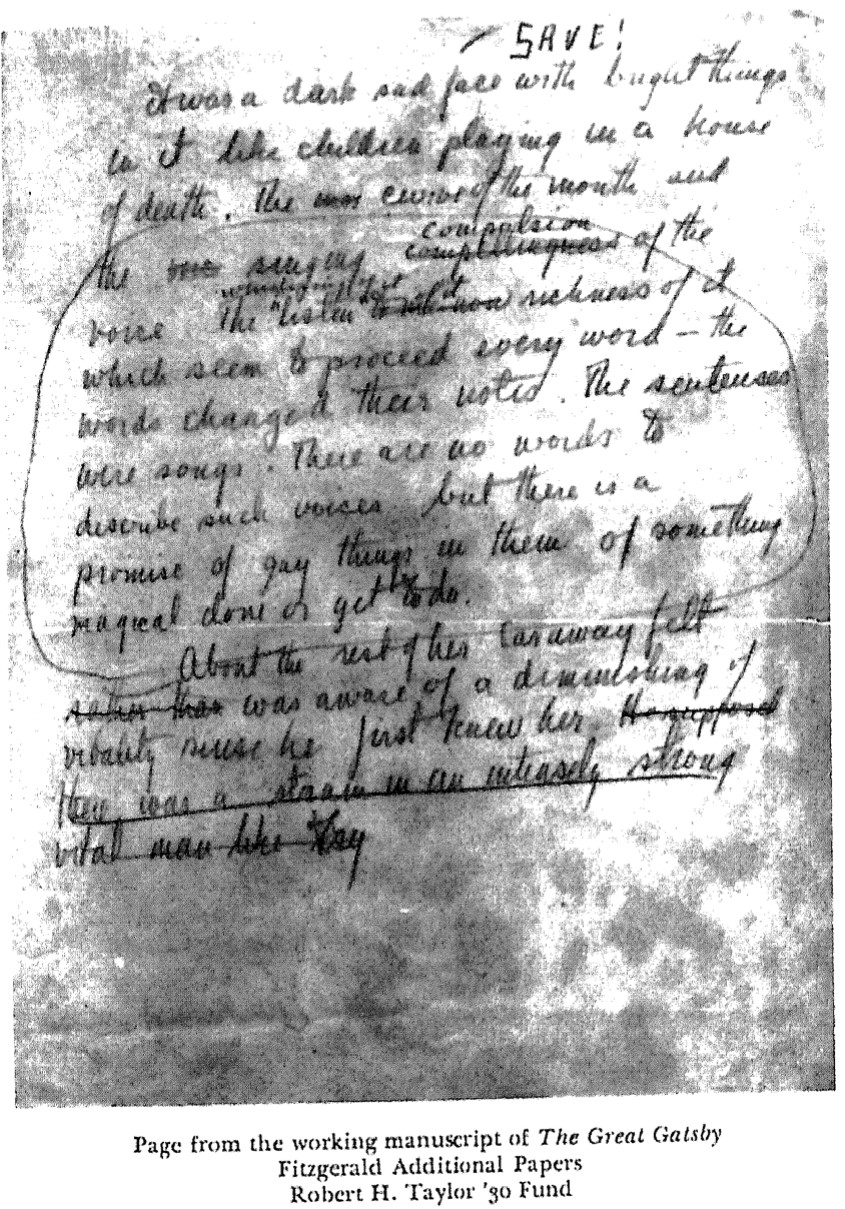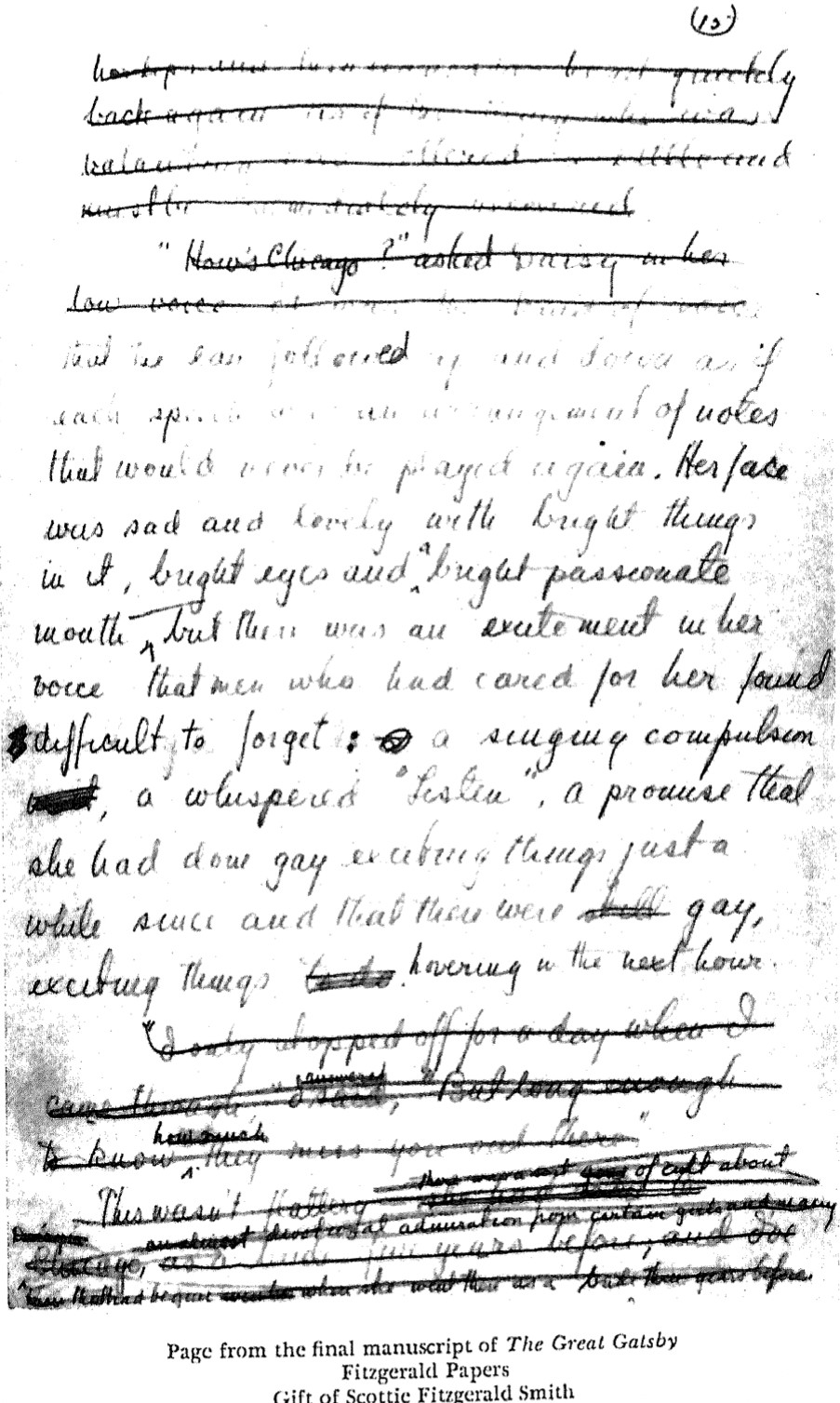
“An Instance of Apparent Plagiarism”: F. Scott Fitzgerald, Willa Cather, and the First Gatsby Manuscript, By Matthew J. Bruccoli
The Princeton University Library has recently acquired a letter from F. Scott Fitzgerald to Willa Cather enclosing two pages from a working manuscript of The Great Gatsby[1]. Concerned that he had inadvertently echoed Cather's short novel, A Lost Lady, Fitzgerald explained in late March or early April 1925 that his evocation of Daisy's voice, which resembles Cather's description of Marian Forrester, had been written before he read A Lost Lady.
Hotel Tiberio, Capri, Italy
My Dear Miss Cather:
As one of your greatest admirers—an admirer particularly of My Antonia, A Lost Lady, Paul's Case and Scandal I want to write to explain an instance of apparent plagiarism which some suspicious person may presently bring to your attention.
To begin with, my new book The Great Gatsby will appear about the time you receive this letter (I am sending you the book besides). When I was in the middle of the first draft A Lost Lady was published and I read it with the greatest delight. One of the finest passages is the often quoted one toward the end which includes the phrases “she seemed to promise a wild delight that he has not found in life. . . “I could show you” . . . ect (all misquoted here as I have no copy by me).
Well, a month or two before I had written into my own book a parallel and almost similar idea in the description of a woman's charm—an idea that I'd had for several years. Now my expression of this was neither so clear, nor so beautiful, nor so moving as yours but the essential similarity was undoubtedly there. I was worried because I hated the devil to cut mine nut so I went to Ring Lardner and several other people and showed them mine and yours and finally decided to retain it. Also Ive kept the pages from my first draft to show you and am enclosing them here. The passage as finally worked out is in my Chapter One. Hoping you will understand my motive in communicating this to you I am
With Best Wishes and Most Sincere Admiration
F. Scott Fitzgerald
The passage Fitzgerald quoted from memory appears on pp. 171-72 of A Lost Lady (New York: Knopf, 1923):
Her eyes, when they laughed for a moment into one's own, seemed to promise a wild delight that he has not found in life. “I know where it is,” they seemed to say, “I could show you!” He would like to call up the shade of the young Mrs. Forrester, as the witch of Endor called up Samuel's, and challenge it, demand the secret of that ardour; ask her whether she had really found some ever-blooming, ever-burning, every-piercing joy, or whether it was all fine play-acting. Probably she had found no more than another; but she had always the power of suggesting things much lovelier than herself, as the perfume of a single flower may call up the whole sweetness of spring.
As published, the description of Daisy's voice on p. 11 of The Great Gatsby (New York: Scribners, 1925) reads:
Her face was sad and lovely with bright things in it, bright eyes and a bright passionate mouth, but there was an excitement in her voice that men who had cared for her found difficult to forget: a singing compulsion, a whispered “Listen,” a promise that she had done gay, exciting things just a while since and that there were gay, exciting things hovering in the next hour.
On 28 April 1925, Willa Cather replied, saying that she had enjoyed reading Gatsby before she received Fitzgerald's letter and that she had not detected any duplication of A Lost Lady. She acknowledges that many authors have tried to say that same thing, but none has succeeded. The only way to describe beauty is to describe its effect and not the person. Fitzgerald pasted this letter in his scrapbook[2].
Apart from demonstrating Fitzgerald's scrupulous literary honesty as well as the care with which he had read Willa Cather, these documents provide a significant supplement in our knowledge about the composition of Gatsby: they are the only known pages from the working draft that preceded the complete 1924 manuscript now in the Princeton University Library.
A Lost Lady was published 14 September 1923. Since Fitzgerald notes that he “was in the middle of the first draft” of ins novel when he read Cather's novel, it now seems highly probable that Fitzgerald was working on the final plot of Gatsby earlier than has been thought. Until the discovery of the pages he sent Cather, it had appeared that Fitzgerald did not conceive the Gatsby-Daisy- Nick plot until spring 1924. These manuscript pages attest to the existence of at least a partial working draft in 1923 which Fitzgerald then completely rewrote—not revised—in 1924. Apart from the name changes (Jordan Vance became Jordan Baker and Ada became Daisy), the crucial difference between the drafts is that the 1923 draft was written from tire point of view of tire omniscient author. Nick Carraway did not become tire narrator until Fitzgerald rewrote the novel in 1924. Moreover, tire evidence of the paper reinforces the separation of these drafts. Tire pages Fitzgerald sent to Cather are on 81/2 X 11 paper watermarked SHAMROCK TYPEWRITER LINER, whereas the complete 1924 draft is on 83/8 X 127/8 paper watermarked CASCADE BOND / U.S.A.
On the basis of two pages it is impossible to tell how close to the published novel the plot of the 1923 draft really was. Fitzgerald was living in Great Neck, Long Island in 1922-24 and seeing Maxwell Perkins regularly, so there is little editorial correspondence about Gatsby during this period. The original conception of the novel, which Fitzgerald reported to Perkins in June 1922, was for a novel set in the Midwest and New York in 1885 with “a catholic element.” No manuscript survives for the Ur-Gatsby, and there is no outside evidence that Fitzgerald ever began writing it. Fitzgerald’s Ledger mentions the novel only four times before the Fitzgeralds went to France in May 1924:
June 1923: Begin my novel
July 1923: Intermittent work on novel
September 1923: A new schedule + more work on novel
April 1924: Out of the woods at last + starting novel
In April 1924, Fitzgerald informed Perkins that he had decided to rewrite the novel from a “new angle”: “Much of what I wrote last summer was good but it was so interrupted that it was ragged + in approaching it from a new angle I've had to discard a lot of it—in one ease 18.000 words (part of which will appear in The Mercury as a short story). [3]“It is not clear whether the “new angle” was just the new narrative frame or a new plot as well. The fact that this short story. “Absolution,” treats Catholicism led me to conclude that the summer 1923 draft was for the Ur-Gatsby[4]. However, the two manuscript pages Fitzgerald sent Willa Cather indicate that the plot of the 1923 draft of Gatsby was probably close to the plot of the published novel.
It is dear, then, that Fitzgerald's rapid progress with The Great Gatsby on the Riviera in the summer of 1924 was aided by an earlier working draft. Since Fitzgerald usually exaggerated his progress on a novel, his claim to Willa Cather that he was “in the middle of the first draft” in September 1923 may be regarded with suspicion. Even if this draft was half written, there is no evidence that it was ever finished. The existence of the 1923 draft—of whatever extent—in no way diminishes Fitzgerald's achievement in completely rewriting The Great Gatsby between June and September 1924. The process did not end there, of course. He revised the typescript and galleys until February 1925.
Notes:
[1] This article was suggested to me by Charles Scribner III who generously gave me his notes. Mr. Scribner discovered the letter and manuscript pages in the Seven Gabies Bookshop, New York City, shortly after they were purchased from Dr. William H. Button whose family knew Miss Edith Lewis, one of Willa Cather's literary trustees. They are printed with the permission of Scottie Fitzgerald Smith.
[2] Since Fitzgerald was in Europe when Gatsby was published on 10 April 1925, he could not inscribe copies of the book. He provided Scribners with inscription slips to be pasted in presentation copies. Willa Cather's copy has not been located. Because of restrictions in Cather's will, the text of her letter to Fitzgerald cannot he reproduced.
[3] “Absolution,” The American Mercury (June 1924).
[4] “Introduction,” The Great Gatsby: A Facsimile of the Manuscript (Washington, D.C.: Bruccoli Clark/Microcard Editions, 1973), pp. xiv-xv.
Published in The Princeton University Library Chronicle magazine (Volume XXXIX, Spring 1978, Number 3).



